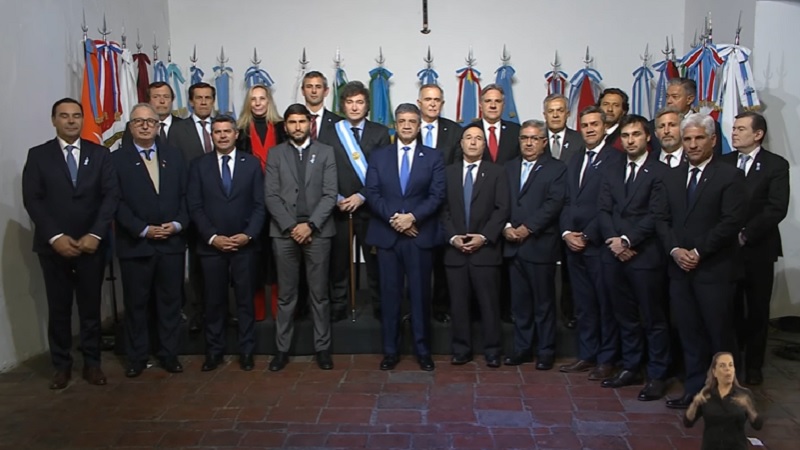
Following the approval of the Bases Law and the fiscal package –with bought votes and in the midst of brutal repression– Javier Miley headed this Wednesday, July 9 at 00hs, the signing of a text with 10 points, with governors and former president Mauricio Macri. The government chose the anniversary of Argentine independence, to sign off on its project of national surrender, adjustment and recession. The vice president Victoria Villarruelthrough its spokesmen, had reported that did not participate “due to a case of flu.”
But The agreements that the government managed to put together are tied with wires. And Javier Milei’s management has been showing a resounding failure both in the fall of economic activity, as well as in social indicators such as poverty, unemployment and social inequality. At the same time, both the IMF, as well as the big soybean businessmen and the “markets”, are pushing for a devaluation, which Minister Luis Caputo does not want to face, because The last of their popularity could disappear in a short time. after 6 months of a management that brought recession, layoffs and increasing misery.
The “Pact” was a staged event, held in the province of Tucumán, attended by 18 provincial governors. The “May Pact” was signed in July, after long months of negotiations, involving personal favors and extortionby the government of Javier Mileywith the participation of the former Minister of the Interior and current Chief of Staff, Guillermo Francos. The only former president who will accompany the signing is Mauricio Macri.
The Government achieved this pantomime of political discipline, which is very weak, after months of withholding funds to the provinces, affecting the salaries of teachers and state workers and paralyzing public works. Francos’ role was to negotiate province by province, with this “extortion” on the table. At the same time, for the vote on the Law of Bases, personal positions were offered to buy votes, and mining businesses were attended to in the case of the provinces that voted in favor of the Regime of Incentives for Large Companies (RIGI). A whole battery of corrupt dealings, in the best style of the caste.
On the other hand, let us remember how little the airs of rebellion of the Chubut governor of the PRO lasted, Ignacio TorresAnd how quickly the Tucuman legislators broke with Unión por la Patria, to align themselves with Milei’s government. The same thing happened with the Peronist governor of Misiones, although the budget crumbs were not enough to avoid the rebellion of the teachers and health sectors, which was joined in solidarity by a large part of the people of Misiones.
Who signs?
11 governors are provided by the UCR and the coalition of Together for Change: Rogelio Frigerio (Between rivers), Gustavo Valdes (Corrientes), Alfredo Cornejo (Mendoza), Marcelo Orrego (San Juan), Maximilian Pullaro (Santa Fe), Ignacio Torres (Chubut), Carlos Sadir (Jujuy), Leandro Zdero (Chaco), Claudio Poggi (Saint Louis), Generated Zamora (Santiago del Estero) and Jorge Macri (Autonomous City of Buenos Aires).
And 8 governors come from the Peronism. Oswald Jaldo (Tucumán), fully adapted to Milei’s government, provided the votes for the Ley Bases from the beginning. Raul Jalil (Catamarca), collaborated to approve the RIGI and the restitution of the Income Tax for workers. Massist Gustavo Sáenz (Salta). Martin Llaryorafrom Cordoba Peronism. The ex-Kirchnerist Claudio Vidal (Santa Cruz). Hugo Passalacqua (Missions). Alberto Weretilneckwho supported Massa in the runoff (Río Negro). And Rolando Figueroa of the Neuquén Popular Movement.
Absences
Only 5 provincial governors rejected the invitation. Axel Kicillof (Buenos Aires), Gustavo Melella (Land of Fire), Sergio Ziliotto (The Pampa), Ricardo Quintela (La Rioja) and Gildo Insfran (Formosa).
But political leaders, former presidents and members of the judiciary were also invited. Apparently, those who are not directly tied to the executive branch for budgetary reasons, do not attend.
Expression of the precariousness of this agreement is the location of the block of Miguel Angel PichettoAlthough they say they agree with the 10 points proposed by Javier Milei, they do not want to be stuck signing a pact that seems to them “a photo and a piece of paper.” In the same way, this block supported the Law of Bases and has been guaranteeing governability to La Libertad Avanza.
Among the former presidents, even Isabel Perón was invited. But, except for Macri and Adolfo Rodríguez Saá, Nobody agreed to participate.
The members of the Supreme Court of Justice were also absent: neither Horacio Rosatti, nor Carlos Rosenkrantz, nor Juan Carlos Maqueda, nor Ricardo Lorenzetti. They were invited, but they did not give any explanation for the snub.
The absence of Vice President Victoria Villarruel, with whom Javier Milei has had an internal conflict since the beginning of his mandate, was very noticeable. The author of the nickname “jamoncito” (little ham) gave the excuse of being sick with the flu. But the absence is significant, given the importance that the Government wants to give to this formal meeting.
What is signed?
These are 10 points that support the brutal and recessive adjustment that the Government has been applying. And the surrender of natural common goods and “economic opening” that imply greater submission of the country to foreign companies and capital. On the anniversary of Independence, the neo-colonial course that Javier Milei seeks to carry out will be validated. At the same time, the surrender of labor rights and the advance in privatizations and attacks on the public sector are reflected.
- The inviolability of private property.
- The non-negotiable fiscal balance.
- Reducing public spending to historic levels, around 25% of the Gross Domestic Product.
- A useful and modern initial, primary and secondary education, with full literacy and no school dropouts.
- A tax reform that reduces the tax burden, simplifies the lives of Argentines and promotes trade.
- The re-discussion of federal tax sharing to end once and for all the current extortionate model suffered by the provinces.
- The commitment of the Argentine provinces to advance the exploitation of the country’s natural resources.
- A modern labor reform that promotes formal work.
- A pension reform that gives sustainability to the system and respects those who contributed. (I bring up the subject of private pensions.)
- Opening up to international trade, so that Argentina can once again become a protagonist in the global market.
Beyond this staging, Javier Milei still has to put into concrete action the pacts he managed to get from the political caste. Privatizations, reform of the State, attacks on labor rights, surrender of natural common goods. Without a doubt, the Government will encounter resistance from workers and the people. And, added to the terrible economic scenario, with a plan that does not even seem to be supported by the markets or the IMF, Javier Milei’s presidency shows many weaknesses and contradictions.
Source: www.laizquierdadiario.com

